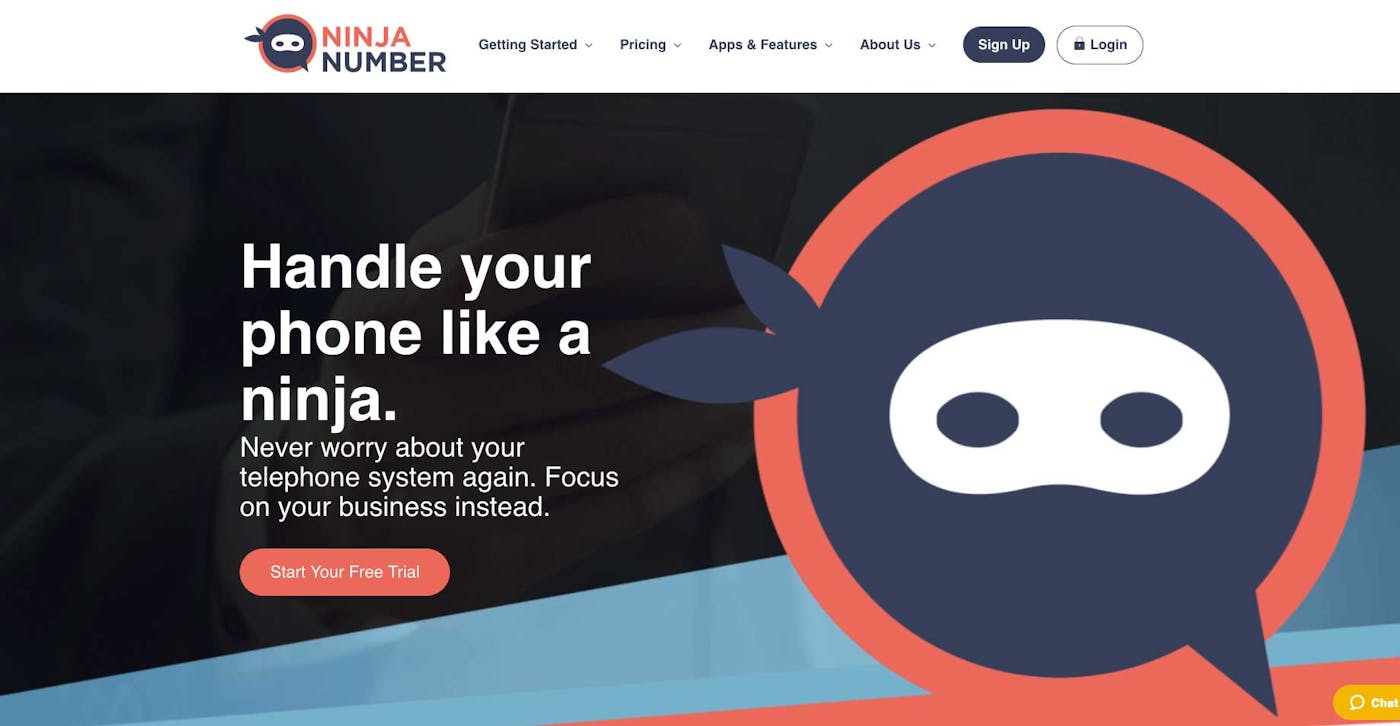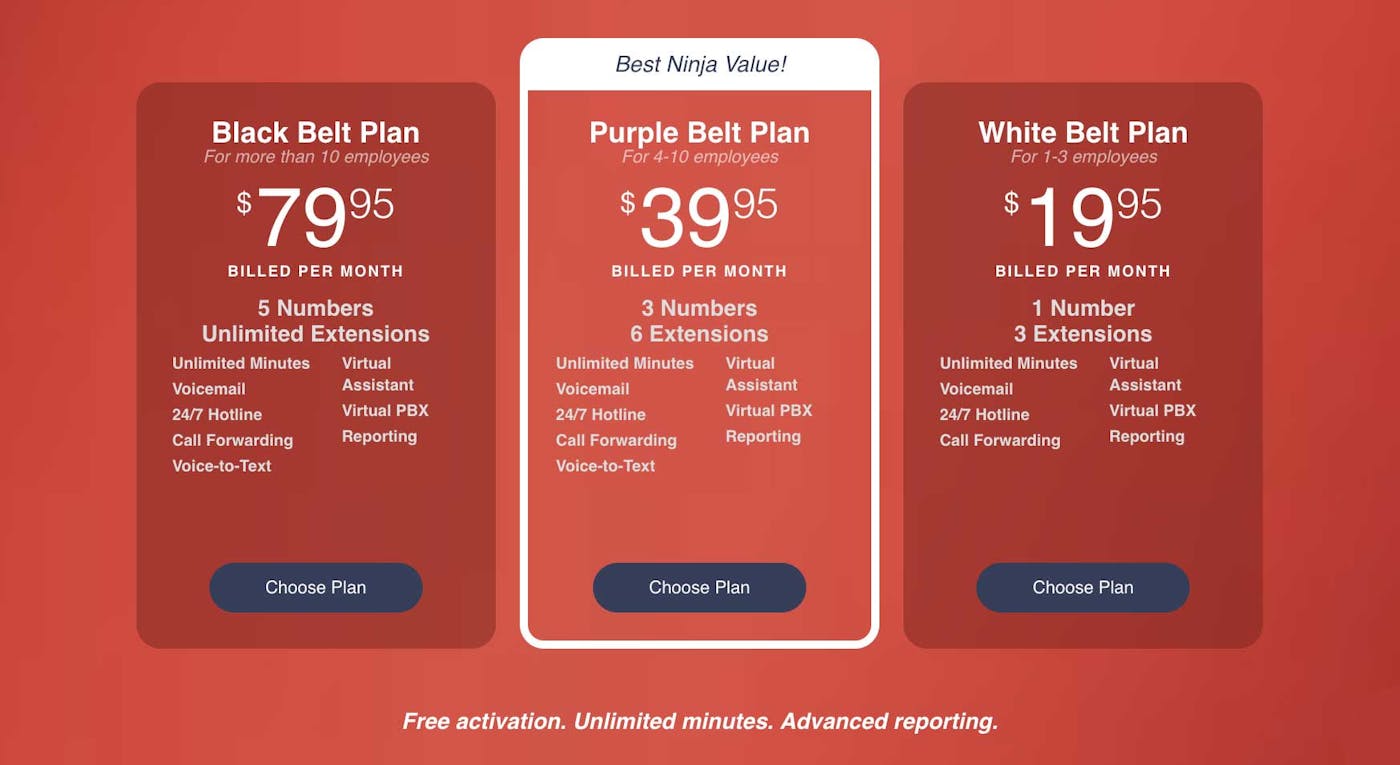Navigating the Challenges of Growing a Virtual Phone
System
Hello! What's your background, and what are you working on?
I'm Jennifer Bailey, marketing manager for CirraVox, the company that created Ninja Number, which is the simplest virtual phone system for entrepreneurs and small businesses. Our phone system has 5 different applications you can use: voicemail, call forwarding, a 24/7 hotline message, a virtual assistant and multiple extensions. We're just launching this product, but our technology is based on years of research at our parent company, VoiceNation, and the legacy product, NextPBX.
We designed Ninja Number to be easy to use, transparent, and reliable, so you don't have to think about your phone system. You can continue to grow your business and never worry about customers not reaching you.

What motivated you to get started with Ninja Number?
VoiceNation has been in existence since 2002, and NextPBX, the virtual telephone system that was developed through VoiceNation, has been delivering virtual phone services since 2017. NextPBX received lots of customer feedback over the years, and we found that people described the product as precise, reliable and consistent. But it, like so many voice systems out there, was too complicated — too many options, too many features to customize, and too many people getting confused.
We decided to break down the paradigm for a telephone system. We were going to simplify our product and focus on doing those things that our customers wanted most, and doing it well. We wanted the product to be easy to use, transparent and reliable.
That's where the ninja comes in. We found that all those characteristics we were looking for were present in a ninja. Our product works in the background, loyal and reliable, yet powerful, just like a ninja. Our product was evolving so much that we decided to change the name of the product from NextPBX to Ninja Number.
What went into building the initial product?
It took us about 3 months to conceptualize what we wanted to do, and then another 3 months to do the actual coding. We had three developers working on both the back end and front end. We did our programming in PHP, and it interacted with a legacy voice platform that we had running as part of NextPBX. We used jQuery for the front-end development.
In terms of funding, we were fortunate that we had an existing base of NextPBX customers that brought in revenue. So we were self-funded.
Part of the planning we had to do was figuring out what to cut from the multitude of offerings that we had; for instance, we had to make a decision on whether people really wanted to control how many times their phone rang before voicemail picked up. You'd think that would have made our job easier, but our CEO, Jay Reeder, challenged us to make the interface very simple. He came up with the idea of a conversational interface ChatBot to guide customers through the customization process. So we had some additional coding to do. And I think that's what makes our product unique. There are no form fields, drop-down menus, or submit buttons. You just answer a few questions, and our system does the rest.
How have you attracted users and grown Ninja Number?
We did a soft launch on March 22 and tested it on all devices (kicked the tires, checked for broken links, made sure our sign-up forms worked) and officially debuted on March 30. Traffic is steadily increasing as Google finds our site and we begin to grow some organic links. Our customers are entrepreneurs and owners of small businesses who are currently using their cell phones as the company's phone. We want to make it easier for them to do business and not have to worry about missing a call from a customer.
As for growing our user base, we already get some traffic due to VoiceNation, which is a big referral for us. Of course, we are optimizing our site for SEO, as well. We're looking at some online advertising opportunities, including Facebook and PPC campaigns. We're also focusing a lot on brand awareness. We're new to people; they don't know our Ninja brand, and we need to introduce it to them, get them familiar with it and have them equate it with simplicity and reliability. We hope to leverage influencer marketing to help us get credibility and awareness.
What's your business model, and how have you grown your revenue?
We make money when someone signs up for our service. We're unique in that we offer a 7-day free trial with no obligation, and no credit card required. We have three plans which start at $19.95 a month, depending on how many numbers or extensions you want. We're SaaS, so people can cancel at any time, and we are constantly focusing on customer satisfaction. We've built a knowledge base of more than 100 questions, as well as a support ticket system that is handled by two support specialists.
Since we're brand new, we're still waiting for sales figures to come in, but we hope to pull in $1 million in revenue this year.

What are your goals for the future?
We plan on adding a few more features, including text-to-voice, which will allow you to type in a greeting for your phone message and have it converted to a professional-sounding voice in several languages. We're working on SMS capability, which will allow your voicemails to be texted to you and allow you to respond to customers through texting. We're also going to roll out a mobile app, which will allow you to do everything you can do on the desktop version.
But we don't want to experience product bloat. We still want Ninja Number to be easy and efficient. Other products may have more features, but we've found that people just need the basics, and that's what we promise to provide. We will focus on making the user experience easy and the system as reliable as possible.
What are the biggest challenges you've faced and obstacles you've overcome? If you had to start over, what would you do differently?
We had two major obstacles that I think all development shops experience: trying to identify tasks and sub-tasks that need to get done (and doing them in the right order), and trying to do too much in too short of a time period. To fix it, we've hired an Agile Scrum Master to help keep us on track and make sure we can deliver a product, feature or bug fix within a specified time.
Another challenge was making sure that all of the disparate systems can talk to each other, the phone platform, billing system, CRM, and knowing that when changes were made to these systems, we had to make sure it didn't break anything that we were doing. That involved a lot of system testing, integration testing and unit testing.
One thing we wanted to do was leverage open source. Besides basing our programming on a LAMP stack, we relied on existing open-source platforms such as Kill Bill and SuiteCRM.
Have you found anything particularly helpful or advantageous?
The rebranding was fun. When Jay came up with the concept of a ninja, we knew we had a lot to work with. Ninjas are agile, invisible, trustworthy and prepared, and we developed a style guide that reflected our tone of voice. We ninja-fied everything from our content to our images. We even named our Ninja (Cirra). We think that recognition of the brand and the traits that a ninja possesses will help us in the long run.
We were also blessed with a great development team who worked hard and wanted to create a quality product. As I mentioned before, we tested it thoroughly, and the developers worked to fix any bugs. We worked for several months to make sure this first iteration of Ninja Number was as stable and reliable as possible.
What's your advice for indie hackers who are just starting out?
Be aware of changing technology trends and use them to your advantage. Don't try to reinvent the wheel. Just try to make something better and easier to use. That's what we're trying to do with Ninja Number.
Another piece of advice is to leverage open source whenever possible. There's a great community of developers contributing to software, and you can't beat the costs.
Where can we go to learn more?
Visit us at Ninja Number. You can also ask us questions in the comments, and we'll be glad to answer them!

While this is a nice interview, I wonder: are they really Indie Hackers? Does this belong here? They were obviously funded by the parent company from the get-go. They already started out with quite a big team (in comparison to the typical Indie Hacker). They had an existing customer base which they can leverage.
In short, I don't think they're indie hackers and this interview doesn't belong here.
HI, nice article I like the ninja idea it’s smart. Can you please explain the benefits of using killbill.io compared to just using stripe? I didn’t know about killbil.io, it seems interesting but also seem to require more integration work than just stripe. PS: please give open source project credits by at least linking to their website. Cheers thomas
Hi Tom! Thanks for your reply. Yes… our complex recurring billing needs with monthly subscription along with the possibility for usage based billing for certain features is better served by a more robust billing package. With KillBill, we can use any back-end merchant, allowing us to negotiate better rates as volume builds. Hope that answers your question! Thanks.
Yes it does cheers.